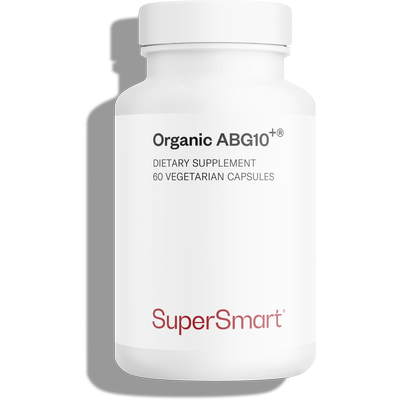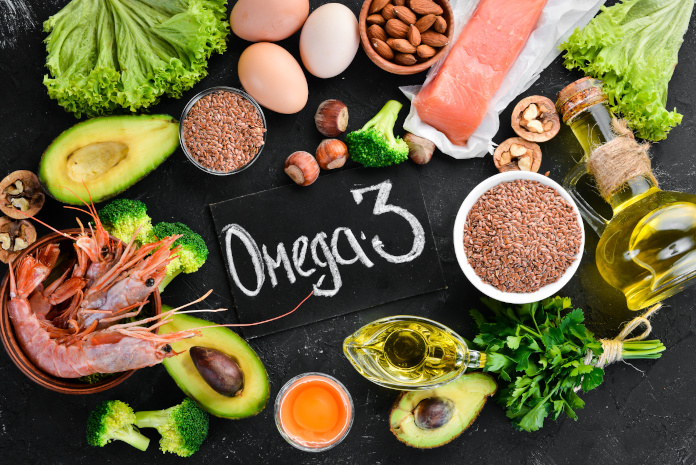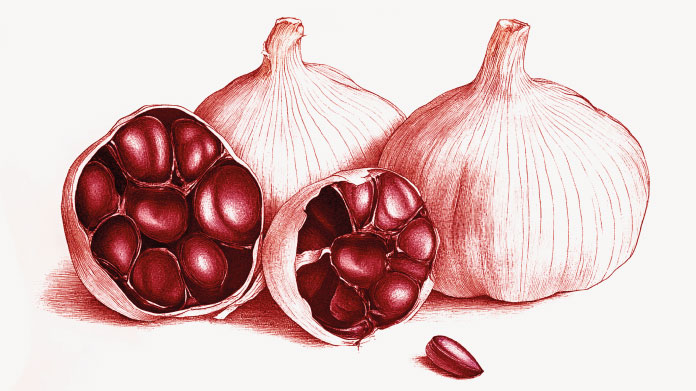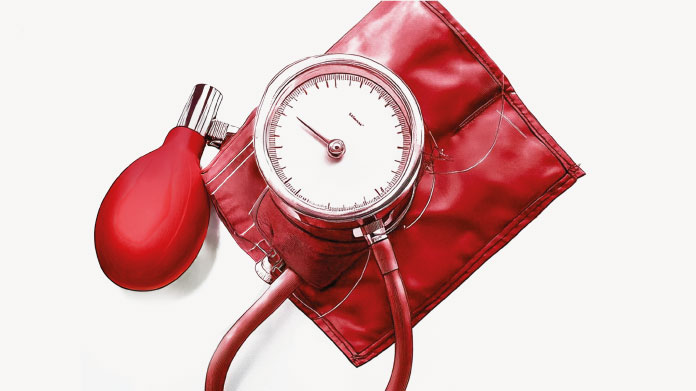How can you use garlic to lower your blood pressure?
Garlic is an effective remedy for hypertension, a condition that can cause heart disease. This article describes how garlic can be used to lower blood pressure naturally.

Garlic: a natural remedy for numerous ailments
Used for thousands of years by many Mediterranean civilisations, both in cooking and as a traditional natural remedy, garlic is packed with beneficial properties (1).
In addition to being high in manganese, vitamin B6, phosphorus, iron, copper, selenium and vitamin C, it also contains several active ingredients, making it a natural remedy for many ailments (2).
In particular, it is its richness in organosulfur compounds which is responsible for the health benefits of this plant, especially S-allyl-cysteine, the compound most studied by researchers. Garlic also contains alliin, which is converted into allicin in the presence of an enzyme produced when a garlic clove is crushed or chopped. It’s this molecule which gives garlic its particular smell.
It also undergoes new conversions to produce other organosulfur compounds such as diallyl sulphide, diallyl disulphide and ajoene. Together, these compounds (including S-allyl-cysteine) are responsible for garlic’s ability to (3-6):
- support heart health and the cardiovascular system;
- maintain normal cholesterol levels;
- confer antioxidant effects ;
- support normal immune system function.
This traditional condiment also contains saponins which contribute to its cholesterol-lowering benefits and protective effects on the cardiovascular system. The plant also appears to contain specific proteins with cardioprotective effects.
Garlic for hypertension
The mechanisms behind garlic’s hypotensive effects are still unclear. It probably has a vasodilatory effect which helps to relax and expand blood vessels, and an antioxidant effect which helps protect blood vessels from oxidative stress-induced damage.
A number of studies have compared garlic’s effects with those of a placebo in patients with hypertension (7-9).
The results were clear: “supplementing with garlic extracts could represent an alternative to drugs or an effective complementary treatment for hypertension”, according to the authors of one Australian study.
Is it better to eat garlic raw or cooked if you want to reduce blood pressure?
While raw garlic appears to be more effective at lowering blood pressure, you can also benefit from its properties by eating it cooked.
Although alliin is destroyed by cooking, its derivatives,diallyl sulphide, diallyl disulphide and ajoene, survive cooking and dehydration.
To benefit from white garlic and reduce blood pressure naturally, you can therefore eat it raw, cooked, dehydrated, marinated in olive oil, in infusions or even as garlic extracts, etc.
Black garlic: the benefits of white garlic, supersized!
Obtained via a specific fermentation process, black garlic has an even richer composition than its white counterpart, including significantly more S-allyl-cysteine, thus maximising its benefits (10).
Consuming this aged form of garlic is thus an even better natural option for lowering blood pressure than eating either cooked or raw ‘standard’ garlic.
For how long should you take black garlic supplements?
The only contraindication associated with black garlic is to avoid consuming it before or after surgery because of its potential anti-coagulant effects.
Apart from this, you can take black garlic supplements (such as Organic ABG10+®, an organic supplement standardised to 0.1% S-allyl-cysteine) all year round, alongside a diet designed to lower hypertension, and regular exercise.
Herbal teas for lowering blood pressure naturally
There are many other natural remedies you can use to lower blood pressure. Hypertension-targeting herbal teas and juices are both excellent options.
However, whether the ingredient is garlic or celery, which also has recognised hypotensive effects, the strong flavour of these foods is not to everyone’s taste. That’s why many people choose to take supplements in capsule form, containing standardised quantities of active ingredients, in order to obtain the benefits of these plant-source foods.
The DASH diet for lowering blood pressure
As well as taking a supplement, you could also follow the DASH diet (Dietary Approaches to Stopping Hypertension) to maintain better control of your blood pressure (11).
Developed at the end of the 1990s following two large-scale studies, the DASH diet consists of:
- reducing your salt intake ;
- prioritising healthy fats (especially omega-3 fatty acids) ;
- drinking less alcohol and smoking less ;
- losing weight (excess weight being a contributing factor to hypertension) ;
- taking regular exercise ;
- eating plenty of fresh fruit and vegetables;
- consuming whole grains and pulses ;
- choosing lean meat and fish ;
- eating more seeds and nuts such as almonds, etc.
It’s also worth noting that studies have shown foods high in potassium to also help lower blood pressure naturally: cocoa, bananas, sweet potatoes, artichokes, avocados, etc. are all good sources of potassium. Some excellent dietary habits to adopt!
Le conseil SuperSmart
References
- TESFAYE, Azene et MENGESHA, Worku. Traditional uses, phytochemistry and pharmacological properties of garlic (Allium Sativum) and its biological active compounds. J. Sci. Res. Eng. Technol, 2015, vol. 1, p. 142-148.
- LAWSON, Larry D. et GARDNER, Christopher D. Composition, stability, and bioavailability of garlic products used in a clinical trial. Journal of agricultural and food chemistry, 2005, vol. 53, no 16, p. 6254-6261.
- CERELLA, Claudia, DICATO, Mario, JACOB, Claus, et al.Chemical properties and mechanisms determining the anti-cancer action of garlic-derived organic sulfur compounds. Anti-Cancer Agents in Medicinal Chemistry (Formerly Current Medicinal Chemistry-Anti-Cancer Agents), 2011, vol. 11, no 3, p. 267-271.
- ARIGA, Toyohiko et SEKI, Taiichiro. Antithrombotic and anticancer effects of garlic‐derived sulfur compounds: A review. Biofactors, 2006, vol. 26, no 2, p. 93-103.
- LEE, Da Yeon, LI, Hua, LIM, Hyo Jin, et al.Anti-inflammatory activity of sulfur-containing compounds from garlic. Journal of medicinal food, 2012, vol. 15, no 11, p. 992-999.
- KIM, Sun Min, KUBOTA, Kikue, et KOBAYASHI, Akio. Antioxidative activity of sulfur-containing flavor compounds in garlic. Bioscience, biotechnology, and biochemistry, 1997, vol. 61, no 9, p. 1482-1485.
- RIED, Karin, FRANK, Oliver R., et STOCKS, Nigel P. Aged garlic extract lowers blood pressure in patients with treated but uncontrolled hypertension: a randomised controlled trial. Maturitas, 2010, vol. 67, no 2, p. 144-150.
- RIED, K., FRANK, O. R., et STOCKS, N. P. Aged garlic extract reduces blood pressure in hypertensives: a dose–response trial. European Journal of Clinical Nutrition, 2013, vol. 67, no 1, p. 64-70.
- RIED, Karin. Garlic lowers blood pressure in hypertensive individuals, regulates serum cholesterol, and stimulates immunity: an updated meta-analysis and review. The Journal of nutrition, 2016, vol. 146, no 2, p. 389S-396S.
- CHOI, Duk-Ju, LEE, Soo-Jung, KANG, Min-Jung, et al.Physicochemical characteristics of black garlic (Allium sativum L.). Journal of the Korean Society of Food Science and Nutrition, 2008, vol. 37, no 4, p. 465-471.
- KWAN, Mandy Wing-Man, WONG, Martin Chi-Sang, WANG, Harry Hao-Xiang, et al.Compliance with the Dietary Approaches to Stop Hypertension (DASH) diet: a systematic review. Plos one, 2013, vol. 8, no 10, p. e78412.
Keywords
61 Days
Very happy with the order and the…
Very happy with the order and the prompt team's response to an identified issue with my order.
KUQI Fatmir
68 Days
15 + years as a customer
I have been using their products for over 15 years as I find both the quality and pricing excellent.
Del Chandler
70 Days
Good quick delivery
Good quick delivery
Timothy O Shea
71 Days
Good service
Good communication following order. Product came within the time frame and was well packaged. The only confusing thing I found was in checking out. For some reason it is not clear how to do so and the current system should be improved.
Joe O Leary
80 Days
Simple and fast.
Simple and fast.
Nina
81 Days
Great product was definitely what is…
Great product was definitely what is says and arrived on without issue
customer
87 Days
I love reading those product facts on…
I love reading those product facts on Supersmart.com. Effective health products making permanent changes to my blood-work results and testes. However, I also have to order capsules from other websites.
NORDGULEN Olav
89 Days
Great products
Great products Very easy to choose, to order… and to get at home
Federica mastrojanni
92 Days
Service rapide et bons produits
Service rapide et bons produits
customer
93 Days
Good products and fast delivery
Good products and fast delivery
Trusted
98 Days
Does what it says on the can
I believe in this product Made to highest standard The ordering process is straightforward Delivery time prompt Excellent product, excellent service Happy customer ❤️
Sheba Kelleher
103 Days
Excellents produits
Excellents produits. Rien à dire si ce n'est qu'ils sont très chèrs.
MJS_France
105 Days
Very good supplement
Very good supplement
Glaveash
106 Days
Supersmart supplements are really…effective
Supersmart supplements are really effective and have helped me and family members and friends to improve their health including some of us with severe health problems including some with no existing medical treatment.
Anne Georget
107 Days
SuperBig Supersmart
SuperBig Supersmart
Pierre




